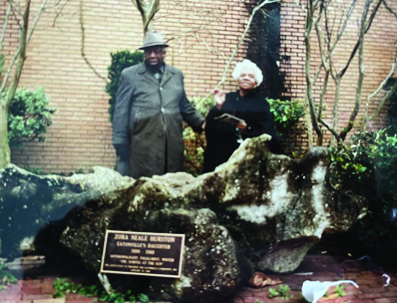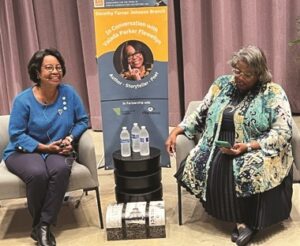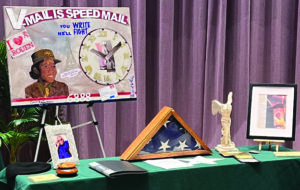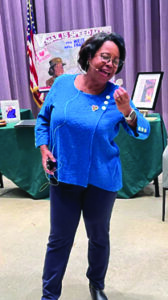



BY HARRY COVERSTON, GUEST WRITER TO THE TIMES
WINTER PARK – On January 19, the voice of Dorothy Turner Johnson resounded from the auditorium of the Winter Park Library at a presentation by the Association for the Study of African American Life and History (ASALH). Brought to life by local artist, poet and long-time family friend Valada Flewellyn and developed by questions posed by Dr. Rebekah McLeod, the audience was treated to the story of a remarkable local heroine.
Johnson was a librarian and a storyteller. She had a particular love for the poetry of Eloise Greenfield whose book “Honey, I Love” was the source of the poem Johnson often asked Flewellyn to read. Hearing her rendition which began her ASALH “In Conversation” presentation, it is easy to understand why it was so cherished: “Honey, let me tell you. I love a lot of things…” a poem which concluded with, “And I love you, too.”
Johnson’s love of books and storytelling was the mere tip of the iceberg. She had begun a career as a librarian during the beginning of World War II. But when the Women’s Army Auxiliary Core (WAAC) was formed, Johnson jumped at the opportunity to serve her country, eager to do her part. She was anxious to see the world and saw the military as presenting the opportunity to do interesting and important work. She enlisted in 1943.
Johnson grew up in Atlanta, the daughter of two teachers who instilled in her the value of education. They sent her to private schools early on before enrolling her at Booker T. Washington High School. Johnson would later say “I had some of the best teachers in the world,” a gift that continued with her education at Spelman College.
Her family also modeled a willingness to engage the world and to open the Black community to its opportunities. Her uncle was one of the first African American physicians in Georgia and was a founding member of one the first Black golf Country Clubs in Atlanta. Her aunt, Fannie Showers Starr, founded the first school for Blacks in Homestead, Florida. This pioneering pattern would play out repeatedly in Johnson’s life.
A 1938 graduate of Spelman with a degree in history, Johnson initially found her opportunities limited. “There was nothing to do but teach,” she said, beginning with her first job as a third-grade teacher in an elementary school in Miami. There she inculcated a love of reading in her young charges finding “They were ready to run with reading. They would eat up everything I put before them.”
But even as she studied and taught history, Johnson recognized the history that schools were offering rarely taught how systems work and impacted its members. It didn’t tell the stories of how power relationships limited the roles Black people could play in the workplace. Johnson quickly learned that if one was a creative teacher, they wouldn’t fit into most schools. And so, she realized early on that if she wanted to work with children, she’d have to find another way.
Given her interest in reading, she began to pursue work as a librarian, initially as a school librarian in St. Augustine and later as a librarian at Spelman College’s Reading Room. That love of reading and libraries would become a permanent aspect of her life.
With the onset of World War II, Johnson looked for a way to do her part for that greater cause. Amidst the distressing news from Europe and the Pacific from the war, she recognized her privilege: “I was in the midst of a lovely campus, a peaceful cocoon, an academic world of women.” But Johnson knew that “the world was erupting around me.” Soon her comfortable cocoon became too much to handle. She wanted something else, something more.
That opportunity came with her enlistment into the Women’s Army Auxiliary Corps (WAACs), a newly formed auxiliary branch of service for women serving in the war effort which would become the Women’s Army Corp (WACs) in 1943.
These were the first women in uniforms and initially the military didn’t know what to do with them. Johnson said there were lots of mistakes made, especially at first, not the least of which was the haphazard manner military presumptions had on the formation of the WAACs. They also endured much hostility from insecure men fearing they’d be replaced by women, men who knew that with the coming of servicewomen, many of them would be relieved of their administrative duties and sent into active duty.
Though Johnson never rose above the rank of private first class, she never worried about upward mobility. She was satisfied with the rich experience she was having, a life that was decidedly different from her former civilian life.
The greatest accomplishment of her unit during the war was a project which involved the sorting of mail to the service men in Europe, the 6888th Central Postal Directory Battalion. This contingent, which evolved in the WACs, was charged with organizing the backed-up system providing mail to servicemen. From the lists the WACs were provided, it was apparent when the last time a given serviceman had received mail. This saddened Johnson and her colleagues who knew how lonely service men overseas must feel.
Once on the ground in Europe, Johnson and her WACs team began working round the clock including weekends. Within weeks, they had dismantled the backup, and the letters had been finally dispersed to the waiting servicemen. Johnson was clear, “Our work mattered.”
At the end of the war, Johnson’s 6888 battalion was transferred to Rouen, France, where she worked at a German prisoner of war camp. There she discovered yet another way to communicate with others. The camp personnel were not supposed to fraternize with the POWs. But these men were craftsmen and were permitted to engage in woodwork, carving decorative items. They would leave their completed work in places their captors could find them. One of Johnson’s cherished possessions was the carving she found awaiting her one day.
Johnson came to see the POWs as fellow human beings. She didn’t view them as enemies, she saw them as victims of the war, just as the Allies could have been had the roles been reversed. And given the trauma our soldiers had endured, she saw them, too, as victims of war.
It’s hardly surprising that Johnson’s legacy would be brought to life by Valada Flewellyn. Their relationship stretched back to the early 1990s when they met at a meeting of Black artists at a local bookstore. When Johnson heard her married name, she immediately asked if she was related to Icabod Flewellen. Icabod Flewellen founder of the first free standing African American Museum, in Cleveland, Ohio in 1953. Valada married his nephew, although the last names are spelled differently. This meeting began a long and loving relationship. Dorothy Turner Johnson became a grandmother figure in the Flewellyn family. She requested they call her “Grand’Mere”.
In an episode of the popular WUCF public television program “Growing Bolder,” Johnson share her belief that “A well lived life comes from what you do. You know this is a great world we live in, and everybody who lives in this world takes something from it and should add something to it. And if we become aware of that responsibility, it enriches our lives, enriches our souls, really.”
That richness would be the reason that in 2015 Dorothy Turner Johnson would celebrate her 100th birthday among friends and admirers at the clubhouse at Disney’s Celebration Village where she was one of its first residents. And given her rich life which added something of great value to the world, it’s hardly a surprise that the local chapter of ASALH would ultimately come to bear her name.
When Valada Flewellyn’s daughter, Tina, turned 13, Johnson sent her a birthday card with a note that read in part: “Make the most of your time during these years, always remembering to make the most of your insatiable curiosity and your love for the beauty of the Earth…” Such counsel well reflects the wisdom of Dorothy Turner Johnson.
That wisdom, developed over 100 years of a vibrant life, is one of many chapters of local history that merits more attention than it has received. Johnson was the embodiment of achievement in the face of resistance with a capacity to see a big picture that embraced the world. But she never kept that wisdom to herself, becoming the paragon of the value of public service, and thanks to ASALH, we now know a little more of that inspiring story.






